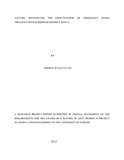| dc.description.abstract | This research project set out to study the factors that influence effectiveness of CBOs in community development programmes in Kibwezi district, Kenya. The four objectives of this study were: i) to establish if governance affects effectiveness of CBOs in community development programmes; ii) to determine if resource mobilization capacity affects CBOs' effectiveness in community development programmes; iii) to determine if the CBO formation process determines its effectiveness in community development programmes; iv) to establish if effective internal management determines CBOs' effectiveness in community development programmes. Literature review did not reveal any study that has been carried out in Kibwezi district of Makueni County in Kenya on the study topic.
Thus this study is the first of this nature in the study area. Review of literature also revealed that studies done in the past describe to an extent the independent variables in CBOs but do not go further to show the relationship between the independent variables and the dependent variable (CBO effectiveness). This study has attempted to establish if there is a relationship between the independent variables and the dependent variable. The research design used for this study is descriptive survey that explored the independent variables that influence effectiveness of CBOs in development programmes in Kibwezi district, Makueni County. The district has 65 CBOs and six CBOs were sampled for the study using stratified random sampling method. The six CBOs have a total of 1536 members and out of 164 sampled 135 participated in the study. Data collection methods that were used are questionnaires.
Since the study was descriptive in nature, data was analyzed using descriptive statistics like frequencies and tables. Linear regression model was also used to establish if the relationship between the independent variables and the dependent variable was statistically significant. The findings show that the four variables taken jointly are significant in their relationship to CBO effectiveness. This means that the four variables taken together can be controlled to influence CBO effectiveness (dependent variable). However, the individual independent variables have no relationship with CBO effectiveness. This means that each independent variable on its own cannot be controlled to influence CBO effectiveness.
However, resource mobilization and effective internal management taken together. are statistically significant in relation to CBO effectiveness. This means that the two variables, resource mobilization and effective internal management, can be controlled to influence CBO effectiveness even without the other two variables, governance and CBO formation process. The recommendations for this study are that the CBO leadership should ensure information sharing and enhanced accountability. The CBOs also should embrace participatory monitoring of CBO activities. Recommendations for future research include use of CBO records for data collection for the same variables. This is to ensure the respondents views are collaborated by the CBO records. | en_US |

